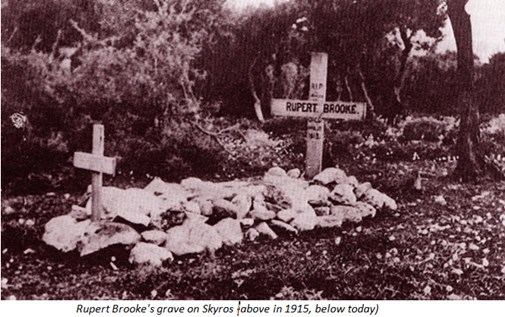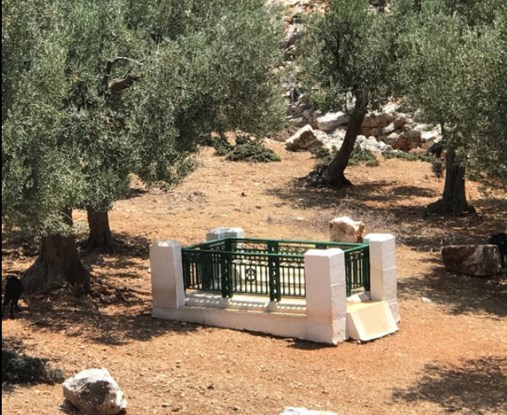Rupert Brooke - The Hood Battalion of the R.N.D.
- Home
- World War I Articles
- Rupert Brooke - The Hood Battalion of the R.N.D.
This is a heavily cut-down version from the 'Letters of Rupert Brooke' which were published across four issues of Len Sellers' Royal Naval Division journals. It's only a small fraction of the letters which are included and which are illustrated with photographs, hand-drawn maps and sketches, mostly unseen elsewhere. These extracts have been selected to give a 'flavour' of his personal thoughts about the noble cause on which he was embarking. The complete series of his letters can be found in the 24 issues of the R.N.D Journals on the WFA members only webpage.
----------------------------------------------------
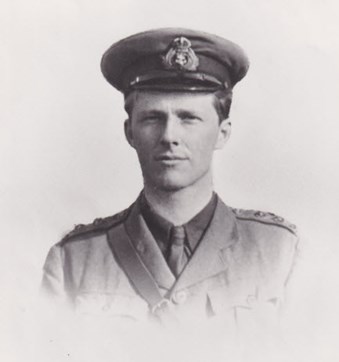
Thursday 18th February 1915. Hood Battalion, Blandford. To Mrs Brooke.
Here I am again, Today and yesterday it has been raining like the worst days of December. But I'm feeling quite well, and refreshed by exercise. The last two or three days at Walmer did me good. It was very quiet and pleasant there. I had to get back here by Monday noon. So I had to come up - with OC - to Downing Street for Sunday night. I dined with Winston and Eddie in Admiralty House. Eddie had to go off after dinner to work, so I spent an amusing evening with Winston, who was too tired for work, after preparing his speech ( a good speech ). He was rather sad about Russia, who he thinks is going to get her 'paws burned', and disposed to think the war might last two years, if Russia got at all badly smashed. But he was very confident about the Navy and our side of Europe. He came down to review us yesterday. It rained all the time, but he was very much pleased. I saw 'Clemmie' in a motor-car for a second: and Eddie came to lunch with the Hood.
Sunday 21st February 1915. Hood Battalion, Blandford. To Dudley Ward.
It's too wonderful. We're going in four days. And the best expedition of the war. Figure me celebrating the first Holy Mass in St. Sophia since 1453. (But this is to your censorial ear.) Reviewed by the King on Wednesday. Off on Thursday. I may want some things. I'll wire if l do. Anyhow I'll send you some letters and instructions etc. It should be a mildish affair. But one might get shot. I want
(1) A waterproof sheet so slight that it folds up and goes into your pocket and weighs a pound - but is not tearable.
(2) Gillette-blades.
(3) A tiny medicine 'chest' for the pocket. Including morphia or some such thing, if possible.
Will you get these or make - say - Geoffrey Fry get them and send them off immediately. I must get them by Tuesday. I enclose a cheque for 3 pounds. I don't know what I owe you. Get the money for these latter purchases from my executors. What bloody fun!
Monday 22nd ? February 1915. Hood Battalion, Blandford. To Mrs Brooke.
Dear Mother,
My address will be, from Friday,
Hood Battalion
2nd Naval Brigade
Royal Naval Expeditionary force
c/o The Admiralty
Whitehall, S.W.
Rather long, isn't it ?
What follows is a dead secret (as is our day of starting). We are going to be part of a landing force to help the fleet break through the Hellespont and the Bosphorus and take Constantinople, and open up the Black Sea, It's going to be one of the important things of the war, if it comes off We take 14-16 days to get there. We shall be fighting for anything from 2 to 6 weeks. And back (they reckon ) in May. We may just lie with the Fleet off there and do nothing. Or we may get a lot of fighting. At any rate, it will be much more glorious and less dangerous than France. It is said - but this I don't know - and some Australians and New Zealanders and Regulars are coming with us. We are only taking 15 days' provisions (beyond what we have on the boats); so we obviously aren't expected to have a long campaign ! I'm afraid we may be Reserves to Marines. We fight from the boats - i.e. we can always get taken off if we have to retreat, so we're pretty safe !
Please don't breathe a word of this to anyone. Don't tell Alfred where we're going beyond the Mediterranean and the fact we're return in May. The fact we're going out now makes it impossible to get him in now. He'd better stick to what he's at. We're taking our Camp Equipment, so it's obviously very possible we're expected to sit in Camp all the time. I'm rather tired after a long day.
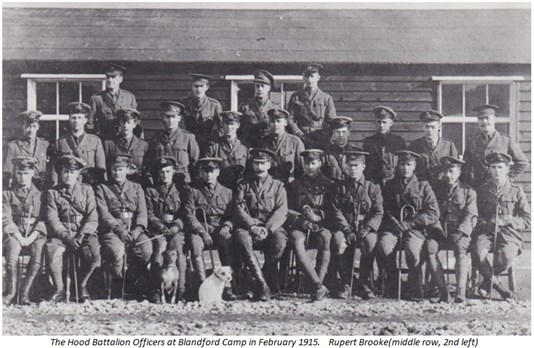
February 1915. Hood Battalion, Blandford. To Violet Asquith.
Oh Violet it's too wonderful for belief. I had not imagined Fate could be so benign. I almost suspect her. Perhaps we shall be held in reserve, out of sight, on a choppy sea for two months ... yet even that - But I'm filled with confident and glorious hopes. I've been looking at the maps. Do you think perhaps the fort on the Asiatic corner will want quelling, and we'll land and come at it from behind and they'll make a sortie and meet us on the plains of Troy? It seems to me strategically so possible. Shall we have a Hospital Base (and won't you manage it?) at Lesbos? Will Hero's Tower crumble under the 15 in. guns? Will the sea be polyphloisbic and wine dark and unvintagable (you, of course, know if it is)? Shall I loot Mosaics from St Sophie's (yes, I understood your telegram)? And Turkish Delight? and Carpets? Shall we be a Turning Point in History? Oh, God! I've never been quite so happy in my life, I think. Not quite so pervasively happy; like a stream flowing entirely to one end. I suddenly realise that the ambition of my life has been - since I was two - to go on a military expedition against Constantinople. And when I thought I was hungry, or sleepy, or falling in love, or aching to write a poem - that was what I really, blindly, wanted. This is nonsense. Good night. ---- I'm very tired with equipping my platoon.
Sunday 6? March 1915. North of Tunis. To Edward Marsh.
It seems ages ago now we said good-bye to you on our mottled parade ground. I saw Violet at Avonmouth. We've had rather a nice voyage: a bit unsteady the first day (when I was sick), & today: otherwise very smooth & delicious. There has been a little, not much, to do. I've read most of Turkey in Europe. But what with parades, & the reading of military books, I've not written anything. Anyway, my mind's always blank at sea. For two days we've been crawling along the Africa coast, observing vast tawny mountains, with white villages this side of them, & white peaks beyond. The sea has been a jewel, & sunset & dawn divine blazes of colour. It is all too ridiculously peaceful for one to believe anything but that we're a - rather odd - lot of tourists, seeing the Mediterranean & bent on enjoyment. War seems infinitely remote: & even the reason, foreseeing Gallipoli, yet admits that there are many blue days to come, & the Cyclades. I wish I were younger: then the five-pointed jewel would have been the height of my wish. Even now it thrills a little. I wear it. Please thank Anonyma & say I'm sure it'll bring me luck. But what 'Luck' is, we'll all wait & see. At least, we'll all wait, & you'll see, perhaps. I can well see that life might be great fun : & I can well see death might be an admirable solution.
In a fortnight, the quarter-million Turks!
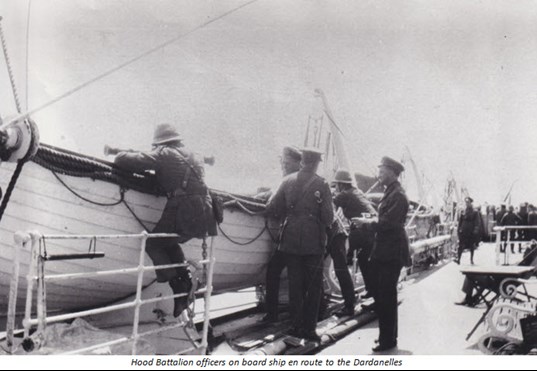
12th March 1915. The Aegean. To Cathleen Nesbitt.
It's a long while since I saw you. And you're a long way away. I've so far been having the most peaceful picturesque romantic unworldly time of my life . What a thing it is to be a soldier, and go lovely yachting cruises in the Mediterranean and the Aegean ! We saw - they said we saw - very far away, Olympus. But with strong field-glasses I could not certainly see the gods. However, its head was shrouded in mist. Also, there was - I think - Parnassus : even farther away than usual, with Wilfred and Shakespeare and the rest on it. And my eyes fell on the Holy Land of Attica. So I can die. And now we're - but I daren't say where: though I think they'll keep this letter till all information is quite un-risky. Suffice it that we're out of sight and hearing of war, in a lovely harbour on a blue sea, with lovely hills around and white peaks in the distance; and about us are various lovely warships - not triremes, though - resting between the spells of blowing Turks out of this world into Eternity. At any moment we may be fetched along to kill the Paynim. Or we may stay here, the world forgetting, by the world forgot till July. The latest opinion is that we'll be here, picnicking over the hills and sleeping on board, for a month. We have no news from the world: not even from the Dardanelles. What a peaceful affair the Naval Brigade is !
The queerest and nicest part of the voyage was Malta. We got in about 3'o'clock, and got leave from 5 to midnight. My dear, it's the loveliest place in an evening sun. Softy white - grey-silver white - buildings, some very old and some new, round a great harbour, all very Southern: like an Italian town in silver-point : liveable and serene, with a sea of opal and pearl and faint gold around. It was nearer than an place I have seen to what a Greek must have witnessed when he sailed into a Greek coast-city. And in the streets - remarkably - was everyone one knew : all the people in other battalions, and a lot of creatures, last seen in London, who'd been taken on at the last minute. And after a Maltese dinner we all went to a very jolly Italian opera house, where La Tosca was being played, and saw still more people we knew and waved and shrieked and threw things to attract their attention, till the stalls and boxes were one mass of Khaki-clothed laughers saying to each other 'How in Hell did you get here'. (For each boat had come alone all the way.) And then we went back happy to our different transports : and at dawn next day started for - no one knew what. So. Such is life. Tomorrow we may be off ... But I fear a long pause
19th - 24th March Somewhere (some way from the front). To Katharine Cox.
My own lot have seen no fighting yet, and very likely won't for months. The only thing that seems almost certain is that one doesn't know from day to day what's to happen. The other day we - some of us - were told that we sailed next day to make a landing. A few thousand of us. Off we stole that night through the phosphorescent Aegean, scribbling farewell letters, and snatching periods of dream broken, excited sleep. At four we rose, buckled on our panoply, hung ourselves with glasses compasses periscopes revolvers food and the rest, and had a stealthy large breakfast. That was a mistake. It is ruinous to load up one's belly four or five hours before it expects it : it throws the machinery out of gear for a week. I felt extremely ill for the rest of that day.
We paraded in silence, under paling stars, along the sides of the ship. The darkness on the sea was full of scattered flashing lights, hinting at our fellow-transports and the rest. Slowly the day became wan and green and the sea opal. Everyone's face looked drawn and ghastly. If we landed, my company was to be the first to land ... We made out that we were only a mile or two from a dim shore. I was seized with an agony of remorse that I hadn't taught my platoon a thousand things more energetically and competently. The light grew. The shore looked to be crammed with Fate, and most ominously silent. One man thought he saw a camel through his glasses ...
There were some hours of silence. About seven someone said 'We're going home.' We dismissed the stokers, who said, quietly, 'When's the next battle?'; and disempanoplied, and had another breakfast. If we were a 'feint', or if it was too rough to land, or, in general, what little part we blindly played, we never knew, and shall not. Still, we did our bit; not ignobly, I trust. We did not see the enemy. We did not fire at them; nor they at us. It seemed improbable they saw us. One of B Company - she was rolling very slightly - was sick on parade. Otherwise, no casualties. A notable battle.
All is well. Good-bye. We're off to Egypt: for repose. For - I imagine - a month at least. What a life! Another campaign over !
5th April 1915. Egypt. To Mrs Brooke.
Here we still are : though not for long, perhaps. It's not been a bad time in some ways: but on the days when there's a bit of a sandstorm, life is almost insupportable. I went down with a slight touch of sunstroke a few days ago. Nothing bad, but enough to make me feel pretty miserable, for a little. Patrick Shaw-Stewart had it a day or two, before me, and now we're both lying in a quiet hotel bedroom, having moved away from Camp. We shall stay here a few days: to get quite well. We ought to be all right in time for any work. It began with a racking headache, sickness and incessant diarrhoea. Feeding on arrowroot has brought the diarrhoea under a good deal: and my temperature and headache have vanished. So I'm well on the way to recovery. So is Shaw-Stewart. A good many of the men have had the same. The glare is awful here.
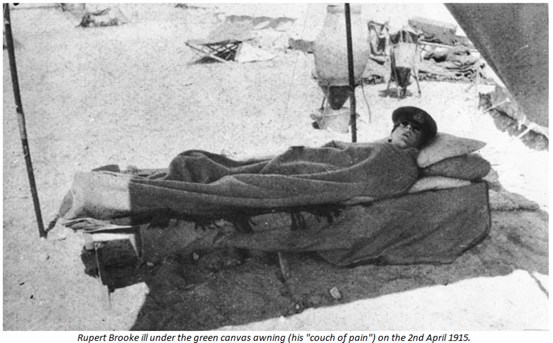
FRAGMENT.
I stayed about the deck, an hour, tonight
Under a cloudy moonless sky; and peeped
In at the windows, watched my friends at table,
Or playing cards, or standing in the doorway,
Or coming out into the darkness. Still
No one could see me.
I would have thought of them
Heedless, within a week of battle - in pity,
Pride in their strength and in the weight and firmness
And link'd beauty of bodies, and pity that
This gay machine of splendour 'ld soon be broken,
Thought little of pashed, scattered....
Only, always,
I could but see them - against the lamplight - pass
Like coloured shadows, thinner than filmy glass,
Slight bubbles, fainter than the wave's faint light,
That broke to phosphorus out in the night,
Perishing things and strange ghosts - soon to die
To other ghosts - this one, or that, or l.
April 1915.
Sunday, 25th April 1915. To Edward Marsh a letter by W. Denis Browne. [note - this has been heavily edited down]
I wonder how long after you hear the terrible news it will be before you get this. The tragedy was so sudden, so inexplicable, so hopeless; the loss so unspeakable. Here are the bare facts.
We got to Port Said on Sat. Mar. 27. So far Rupert had been quite himself On Monday (29th) he went to Cairo with OC & Patrick, & stayed for two days, coming back to Port Said on Mar. 31s (Wed). I went to Cairo that same night, passing Rupert in the train at Ismailia & came back 2 days later on Friday to find him ill with a touch of the sun, a headache & sickness. He slept or dozed outside his tent under an awning all Saturday just as you see him in a photo I sent you. ....... As he got better he developed a little sore on the right side of his upper lip. It swelled up slightly for about 2 days & then went away. ...... We sailed on Sat. April 10th at 6 a.m. ...... it took us 7 days to reach Skyros (via Lemnos) where we anchored on the evening of April 17 (Sat). Rupert ..... was thinner than I remember to have seen him, & weak in proportion; but he picked up as time went on & though he was not up to any great exertion he was on the way to being quite himself again. He was always cheerful, & perfectly normal at this time, & we all thought he was quite fit.
We anchored in Trebuki Bay & went ashore from time to time by companies. On Tuesday last (Ap. 20th) he took part in a Divisional Field Day, {in a] valley between Mts Paphko & Komaro, with Mt Khokilas (the highest point of the island) at its head. A mile up this valley above the dry river bed is an olive grove of a dozen trees, which I'd noticed two days before for its extraordinary beauty....... He liked the place & spoke of it: and it was here that we buried him.
Next morning he stayed in bed, feeling seedy I heard. Somehow I did not see him until after dinner that night, when I looked in to ask how he was.... . He said he felt very bad & didn't want the light on.. He complained of a swelling on the left side of his upper lip. He was evidently not up to very much, & I left him. Next morni ng, he was worse. The Battn. Surgeon was not anxious about his lip, but was worried because he had pain in his chest & back. At midday he got really anxious & sent for the A.D.M.S., the D.A.D.M.S. & the Brigade S.M.O. They came over & the conclusion they arrived at was that he had practically no chance of getting over it: the diagnosis was acute blood-poisoning [and took] him straight aboard the Duguay-Trouin........ The surgeons did everything they possibly could.
On Friday he was not conscious at all up to the very last & felt no pain whatever. .......I sat with Rupert. At 4 o'clock he became weaker & at 4.46 he died....... We buried him the same evening in the olive grove I mentioned before - one of the loveliest places on this earth, with grey-green olives round him, one weeping above his head: the ground covered with flowering sage, bluish grey & smelling more delicious than any other flower I know.
The funeral service was very simply said by the Chaplain and after the Last Post the little lamp-lit procession went down the narrow path to the sea. [We] stayed behind & covered the grave with great pieces of white marble which were lying everywhere about. cross at his head you know: it was the large one that headed the procession. On the back of it our Greek interpreter wrote in pencil.
Here lies the servant of God, Sub-Lieutenant in the English Navy, who died for the deliverance of Constantinople from the Turks.
At his feet was a small wooden cross sent by his platoon.
